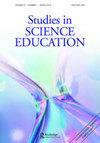谈判、嵌入性和非威胁性学习环境作为英语学习者科学和语言趋同的主题
IF 9.9
2区 教育学
Q1 EDUCATION & EDUCATIONAL RESEARCH
引用次数: 37
摘要
在这篇综述中,我们探讨了向英语学习者(ELLs)教授科学的概念,一方面是同时关注语言和内容发展,另一方面是结构化教学和关注学生学习过程之间的平衡。这一探索是通过嵌入在科学写作启发式方法中的理论框架进行的,这种方法体现了以论证为基础的探究的沉浸式取向。从第二语言习得和科学、多元文化和教师教育工作机构的学习理论和实证结果来看,本文探讨了三种学习过程(通过科学语言学习、学习科学语言和生活科学语言)和三种课堂结构(集体近端发展区、对称权力和信任关系以及教师作为决策者)。这篇综述提出了三个主题——协商、嵌入性和非威胁性学习环境——来指导ELL科学教育。本文章由计算机程序翻译,如有差异,请以英文原文为准。
Negotiation, embeddedness, and non-threatening learning environments as themes of science and language convergence for English language learners
In this review, we explore the notion of teaching science to English language learners (ELLs) as a balancing act between simultaneously focusing on language and content development, on the one hand, and between structuring instruction and focusing on student learning processes, on the other hand. This exploration is conducted through the lens of a theoretical framework embedded in the Science Writing Heuristic approach, an approach exemplifying immersive orientation to argument-based inquiry. Three learning processes (learning through the language of science, learning about the language of science and living the language of science) and three classroom structures (collective zone of proximal development, symmetric power and trust relationships and teacher as decision-maker) are explored in relation to learning theories and empirical findings from second language acquisition and science, multicultural and teacher education bodies of work. Three themes – negotiation, embeddedness and non-threatening learning environments – to inform ELL science education emerged from the review.
求助全文
通过发布文献求助,成功后即可免费获取论文全文。
去求助
来源期刊

Studies in Science Education
EDUCATION, SCIENTIFIC DISCIPLINES-
CiteScore
15.30
自引率
2.00%
发文量
7
审稿时长
>12 weeks
期刊介绍:
The central aim of Studies in Science Education is to publish review articles of the highest quality which provide analytical syntheses of research into key topics and issues in science education. In addressing this aim, the Editor and Editorial Advisory Board, are guided by a commitment to:
maintaining and developing the highest standards of scholarship associated with the journal;
publishing articles from as wide a range of authors as possible, in relation both to professional background and country of origin;
publishing articles which serve both to consolidate and reflect upon existing fields of study and to promote new areas for research activity.
Studies in Science Education will be of interest to all those involved in science education including: science education researchers, doctoral and masters students; science teachers at elementary, high school and university levels; science education policy makers; science education curriculum developers and text book writers.
Articles featured in Studies in Science Education have been made available either following invitation from the Editor or through potential contributors offering pieces. Given the substantial nature of the review articles, the Editor is willing to give informal feedback on the suitability of proposals though all contributions, whether invited or not, are subject to full peer review. A limited number of books of special interest and concern to those involved in science education are normally reviewed in each volume.
 求助内容:
求助内容: 应助结果提醒方式:
应助结果提醒方式:


